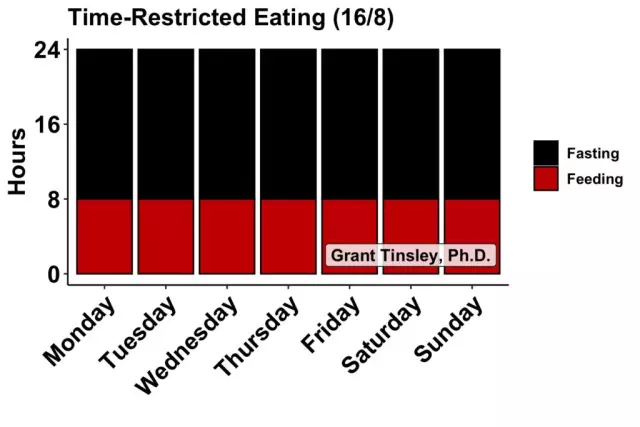- Author Rachel Wainwright wainwright@abchealthonline.com.
- Public 2023-12-15 07:39.
- Last modified 2025-11-02 20:14.
Fasting days: harm or benefit
A lot has been said about the effect of fasting days on the body - both about the advantages and disadvantages. It is believed that a fasting day in the form of a short-term mono-diet is useful, that it contributes to the effective removal of toxins from the body, but irregular, unnecessarily long, spontaneous fasting days only worsen health. How to benefit from a gentle diet and not harm yourself? Let's consider the main advantages and disadvantages of fasting days and their effect on the body.

Source: depositphotos.com
The benefits of fasting days
A fasting day is a diet in which only one or two compatible products are consumed during the day. The most popular are kefir, cottage cheese, cucumber, carrot, apple fasting days, or combined (kefir and apples, kefir and buckwheat, etc.). To muffle the feeling of hunger, food is divided into 5-6 equal parts (5-6 receptions), which allows it to be better absorbed. As a rule, the total calorie content of such a diet does not exceed 1000 calories; however, nutritionists do not recommend consuming more than 700 g of protein foods and 2 kg of vegetables or fruits per day.
Regular (at least once a week) fasting days have three advantages:
- short-term stress for the body, contributing to the restructuring of metabolism and the normalization of metabolism. To maintain the shake-up effect, it is recommended to arrange unloading on different days of the week, so that the body does not adapt to such periods and does not store fat "in reserve";
- cleansing the body. During such a mono-diet, the digestive system rests, which is the prevention of diseases of the gastrointestinal tract, allergic diseases, skin diseases, etc. It is believed that a short-term restriction in food relieves the body of end metabolic products, while adherence to a strict diet for three days and more, on the contrary, provokes their appearance in the form of uric acid salts and other toxins;
- adaptation to the transition to proper nutrition. Several fasting days a month will be an excellent way to prepare the body to increase the proportion of healthy food in the diet and will help avoid allergic reactions and intestinal problems.
Many women, limiting their diet, pursue only one goal - weight loss. Despite the fact that fasting days are easier to tolerate than diets, they do not lead to a persistent decrease in body fat - rather, they can be called a means for maintaining weight at a normal level.
The harm of fasting days
Arranging fasting days, it is important to have an idea not only about the advantages, but also about the disadvantages of such a diet, so as not to unknowingly harm your body. The latter most often include:
- unbalanced diet. Eating only one product for more than 2-3 days in a row means a lack of fat, protein or carbohydrates, which entails a malfunction in metabolism. This can lead to vitamin deficiency, anemia, diseases of the digestive system, so there is no need to increase the number of fasting days in a row, arranging, for example, fasting weeks. And practicing fasting days regularly, it is worth alternating diets according to the composition of the products;
- aggravation of some chronic diseases. In the presence of diseases of the gastrointestinal tract, liver, kidneys, diabetes, fasting days can provoke their exacerbation. But in some conditions, this method is indicated: for example, cucumber days are useful for gout and arthrosis, potato days for heart diseases, etc. In any case, the need for a fasting day should be discussed with a doctor.
It is also worth remembering that excessive enthusiasm for fasting days (more often 2 times a week) can lead to dystrophy of muscle tissue.
Such techniques are strictly contraindicated for children, pregnant women, people suffering from chronic diseases of the gastrointestinal tract, as well as those experiencing fatigue and malaise.
Examples of fasting days
Among others, the most popular are protein (cottage cheese, fish, meat) and carbohydrate (fruit, vegetable) fasting days. Protein, which satisfy appetite well, are easier to eat and are recommended for those who can hardly bear the feeling of hunger. Carbohydrates are more difficult to comply with, but they are the most useful and allow you to eliminate edema, cleanse the intestines, and also enrich the body with useful substances.
Carbohydrate fasting days:
- cucumber (218 kcal) - 1.5 kg of fresh cucumbers in 6-7 doses without salt. At night - a glass of 1% kefir;
- apple (670 kcal) - 1.5 kg of fresh or baked apples with raisins in 5-6 receptions. At night - a glass of 1% kefir;
- vegetable (535 kcal) - 170 g of carrot and apple salad, 200 g of stewed cabbage, 100 g of green peas, 150 g of beetroot salad with prunes, rosehip broth;
- buckwheat - 400 g of boiled buckwheat without salt with mushrooms in 4-5 receptions. At night - a glass of 1% kefir.
Protein fasting days:
- kefir-cottage cheese (780 kcal) - 400 g of cottage cheese, 1 liter of kefir, 2 jars of natural yogurt for 5-6 receptions;
- chicken with vegetables (850 kcal) - 400 g of boiled chicken breast, 800 g of any fresh vegetables. At night - a glass of 1% kefir;
- fish with vegetables - 500 g of boiled fish, 800 g of any fresh vegetables. At night - a glass of 1% kefir.
In addition to protein and carbohydrate, there are fat fasting days when only milk, sour cream or cream are consumed. According to nutritionists, this diet option saturates well and prevents the transition of carbohydrates to fats, but is contraindicated for people suffering from vascular atherosclerosis, liver and biliary tract diseases.

Source: depositphotos.com
Nutritional advice
So that the harm from fasting days does not exceed their benefits, restrictions in the diet should be introduced carefully, observing several important rules:
- do not fill up for future use either in the evening of the day before unloading or after it. The body requires a gradual adaptation to a change in diet, therefore it is preferable to leave the usual diet and return to it carefully, observing food restrictions for some time;
- exclude these days intense physical and mental stress that requires a lot of energy. Otherwise, strict fasting days can result in a violation of body functions, in particular, the nervous system;
- on a fasting day, consume as much clean drinking water as possible - at least 2 liters.
Days accompanied by unloading are well combined with other methods of cleansing the body: massage, lymphatic drainage, visiting a sauna or bath. Like any other restriction on food, fasting days can be accompanied by stagnation of bile, and during this period it is recommended to drink a little choleretic tea before meals.
YouTube video related to the article:

Maria Kulkes Medical journalist About the author
Education: First Moscow State Medical University named after I. M. Sechenov, specialty "General Medicine".
Found a mistake in the text? Select it and press Ctrl + Enter.






